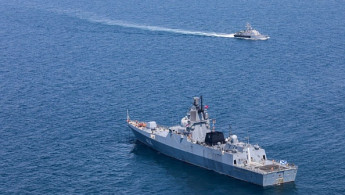Iran forces seize second oil tanker in six days: US Navy
Iranian forces seized a Panama-flagged oil tanker in the Strait of Hormuz early on Wednesday, the US Navy said, the second such incident in less than a week.
The Greek-owned tanker, Niovi, was sailing from Dubai towards Fujairah, another port in the United Arab Emirates, when it was stopped by Iran's Islamic Revolutionary Guard Corps Navy.
#BREAKING The @US5thFleet says Iran's Islamic Revolutionary Guard Corps Navy has seized the Panama-flagged oil tanker Niovi at 6:20 a.m. (0220 GMT) Wednesday while passing through the narrow Strait of Hormuz. Iran's Navy had seized a Marshall Islands-flagged oil tanker Thursday. pic.twitter.com/N9iF6vCBWZ
— Iran International English (@IranIntl_En) May 3, 2023
"A dozen IRGCN fast-attack craft swarmed the vessel in the middle of the strait," said a statement from the Bahrain-based US Fifth Fleet, referring to the Revolutionary Guard's naval force.
"The IRGCN subsequently forced the oil tanker to reverse course and head toward Iranian territorial waters off the coast of Bandar Abbas, Iran," it said.
The troubled but commercially vital Gulf waters, which carry at least a third of the world's seaborne oil, have witnessed a spate of incidents since 2018, when then US president Donald Trump pulled out of a nuclear agreement and reimposed crippling sanctions on Iran.
Wednesday's seizure is the second since the United States seized a Greek-managed tanker carrying Iranian oil, maritime security firm Ambrey said.
Six days ago, Iran's navy seized a Marshall Islands-flagged oil tanker in the Gulf of Oman, a nearby waterway also bordering the Arabian Peninsula and Iran.
The captured oil tanker, named Advantage Sweet, was also moved to Bandar Abbas, TankerTrackers.com said.
The empty Greek-owned, Panama-flagged VLCC supertanker NIOVI (9292498) has been seized this morning by Iran's Islamic Revolutionary Guard Corps Navy (IRGCN). Further details are available with our clients, and we expect to see her in a few hours just north of this location. pic.twitter.com/u51HztrCqy
— TankerTrackers.com, Inc. (@TankerTrackers) May 3, 2023
Ambrey said the latest seizure followed a warning from Greek authorities after the US seized a tanker carrying Iranian oil last month.
"Greek authorities had issued a warning that Greek shipping was at an increased risk from Iran after the detention of a Greek-managed Suezmax tanker carrying Iranian oil," Ambrey said.
Iran has responded tit-for-tat to previous seizures of Iranian oil shipments.
Video footage released by the Fifth Fleet showed at least 11 small boats approaching the Niovi on Wednesday. Iran's Tasnim news agency reported the seizure of the "violator" ship, but did not specify the reason.
Iran has harassed or attacked 15 internationally flagged merchant vessels in the past two years, the US Navy said, calling its actions "contrary to international law and disruptive to regional security and stability".
"Iran's continued harassment of vessels and interference with navigational rights in regional waters are unwarranted, irresponsible and a present threat to maritime security and the global economy," it added.
What the EU blacklisting of Iran's Revolutionary Guards could mean
— The New Arab (@The_NewArab) January 31, 2023
✍ @AlessandraBajec https://t.co/IMIQf69cuS
Tehran's Western rivals toughened sanctions on Iran's Islamic Revolutionary Guard Corps last week.
Iran then announced countermeasures, including financial sanctions and entry bans targeting EU and UK individuals and entities.
Tensions have escalated since 2018 when the US withdrew from the accord with major powers that froze Iran's nuclear activities. Marathon efforts to relaunch the agreement have stalled.
In July 2019, the Revolutionary Guards seized the British-flagged oil tanker Stena Impero in the same waterway for allegedly ramming a fishing boat, and released it two months later.
In 2021, Iran released a South Korean oil tanker it had held for months amid a dispute over billions of dollars seized by Seoul. Last May, Iran also seized two Greek oil tankers.





 Follow the Middle East's top stories in English at The New Arab on Google News
Follow the Middle East's top stories in English at The New Arab on Google News
![The UAE is widely suspected of arming the RSF militia [Getty]](/sites/default/files/styles/image_330x185/public/2024-11/GettyImages-472529908.jpg?h=69f2b9d0&itok=Yauw3YTG)
![Netanyahu furiously denounced the ICC [Getty]](/sites/default/files/styles/image_330x185/public/2024-11/GettyImages-2169352575.jpg?h=199d8c1f&itok=-vRiruf5)
![Both Hamas and the Palestinian Authority welcomed the ICC arrest warrants [Getty]](/sites/default/files/styles/image_330x185/public/2024-11/GettyImages-2178351173.jpg?h=199d8c1f&itok=TV858iVg)